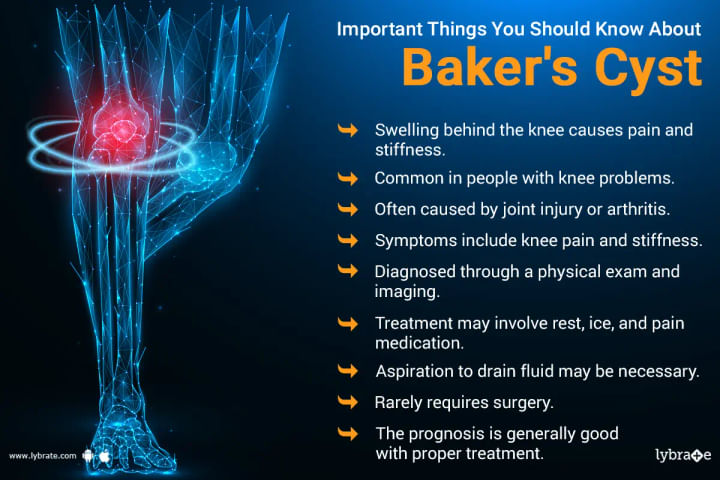Baker Cysts: Symptoms, Causes, and Treatment Options
A fluid-filled sac called a Baker cyst, also called a popliteal cyst, often forms behind the knee. These cysts are relatively common and can cause a range of symptoms, including swelling and discomfort behind the knee. While Baker cysts are not typically serious, they can become painful and interfere with daily activities if left untreated. In this article, we will explore the causes of Baker cyst, the symptoms they can cause, and the various treatment options available to help manage this condition.
Causes of Baker Cyst
The exact causes of Baker cysts are not well understood, however, there are several factors that are believed to contribute to the development of this condition. Understanding the causes of Baker cyst can help individuals better manage their symptoms and reduce their risk of serious health consequences.
- Osteoarthritis: One of the most common causes of Baker cyst is osteoarthritis, a condition that causes the gradual breakdown of cartilage in the joints.
- Other types of arthritis: Additionally, rheumatoid arthritis and gout can raise the possibility of developing a Baker cyst.
- Injuries to the knee: Injuries to the knee, such as a tear in the knee joint's synovial membrane, can also lead to the formation of a Baker cyst.
Symptoms of Baker Cyst
This fluid-filled sac called a Baker cyst can enlarge and hurt behind the knee. While this condition can be relatively mild and cause only minor symptoms, in some cases it can be quite severe and interfere with daily activities. Early identification and efficient therapy of Baker cyst depend on an understanding of their symptoms.
- Swelling behind the knee: Swelling behind the knee, which can be modest to severe, is the most typical sign of a Baker cyst.
- Pain and discomfort: Baker cyst can cause pain and discomfort in the back of the knee, which can interfere with daily activities.
- Stiffness: Baker cyst can cause stiffness in the knee, making it difficult to fully extend the leg.
Potential Complications
Baker cyst are relatively common and generally cause only minor symptoms, but in some cases, they can lead to serious health consequences. Understanding the potential complications of Baker cyst can help individuals take steps to manage their symptoms and reduce their risk of serious health consequences.
- Compression of nerves or blood vessels: In severe cases, a Baker cyst can put pressure on surrounding nerves or blood vessels, causing additional symptoms such as numbness or tingling in the leg.
- Rupture of the cyst: In some cases, a Baker cyst may rupture, leading to fluid draining into the surrounding tissue and causing additional swelling and pain.
- Recurrent cyst: In some individuals, Baker cyst may reappear even after being treated, requiring additional medical attention.
When to See a Doctor?
While Baker cysts are generally not serious and can be managed with conservative measures, in some cases they can lead to serious health consequences. Understanding when to seek medical attention for Baker cyst is key to early diagnosis and effective management of this condition.
- Persistent swelling or pain: If you experience persistent swelling or pain behind the knee, it is important to seek medical attention.
- Interference with daily activities: It's crucial to consult a doctor if a Baker cyst is preventing you from going about your normal business.
- Drainage of fluid: If you experience drainage of fluid from the affected area, it is important to seek medical attention.
- Persistent numbness or tingling: If you experience persistent numbness or tingling in the affected leg, it is important to seek medical attention.
Treatment Options for Baker Cyst
Baker cyst can be managed and treated in a variety of ways, depending on the severity of symptoms and the underlying cause of the condition. From conservative measures such as rest and over-the-counter pain relievers to more invasive treatments such as surgery, there are several options for treating Baker cyst.
- Rest and elevation: Resting the affected leg and elevating it can help reduce swelling and improve symptoms.
- Ice therapy: Applying ice to the affected area can help reduce pain and swelling.
- Pain relievers: Ibuprofen or acetaminophen, two over-the-counter painkillers, can help reduce swelling and relieve discomfort.
- Physical therapy: In order to decrease the chance of developing a Baker cyst, physical therapy can assist to increase range of motion and strengthen the muscles surrounding the knee.
- Drainage: In some cases, a doctor may drain fluid from the cyst to provide relief from symptoms.
- Surgery: In severe cases, surgery may be necessary to remove the cyst and repair any underlying damage to the knee.
It is important to note that these treatment options may not be appropriate for everyone and a doctor can provide personalized recommendations based on the individual's specific needs and health status.
By understanding the causes, symptoms, and treatment options for Baker cyst, individuals can take steps to manage this condition and reduce their risk of experiencing serious health consequences.
Conclusion
Baker cysts are relatively common and can cause a range of symptoms, including swelling and discomfort behind the knee. By understanding the potential complications of this condition and knowing when to seek medical attention, individuals can take steps to manage their symptoms and reduce their risk of serious health consequences.
It's crucial to consult a doctor as soon as you can if you have worries about the health of your knees or exhibit symptoms of a Baker's cyst.



+1.svg)
